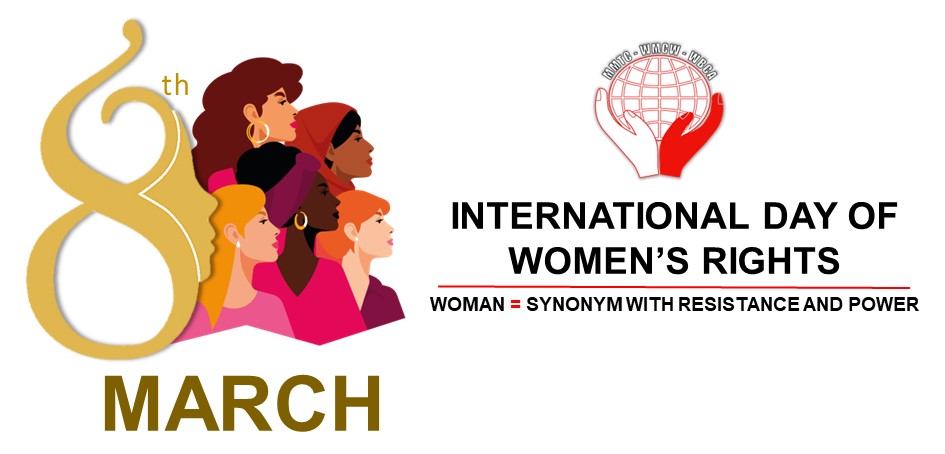
A day strongly rooted in the history of working movement.
In 1910 in Copenhagen, during the 2nd International Socialist Women’s Conference, which gathered to a hundred of women from 17 different countries, the idea of an “An International Women’s Day” was adopted.
The first International Women’s Day was celebrated the next year, on 19th March 1911, to demand women’s right to vote, to work and the end of her discrimination at work.
On 25th March, a fire during a seamstresses’ strike at a Triangle Shirtwaist textile mill in New York kills to 140 of the 500 workers, most of them Italian and Jewish immigrants from Eastern Europe, locked inside the factory. Some of them were only 14. This tragedy, linked to the exploitation of working woman, had a strong impact and later, it was commemorated during the International Women’s Day, that, then, it was linked women’s fight to working movement.
On 8th March 1917, demonstrations of woman workers were taken place in Petrograd. More than 90,000 women took the street to demand better working and living conditions and to oppose the policy led by Tsar Nicholas II and the war which was devastating Europe (1914-1918). These wives of workers and soldiers demanded “bread for their children and the return of their husbands from the trenches”. This event, known as “Bread and Peace”, established on 8th March as the International Women’s Day.
In reference to the struggles and actions taken by women and due to the International Women’s Day in 1975, UN adopted, on 8th March in 1977, a resolution urging to the member countries to celebrate a “United Nations Day for women’s right and international peace”, more commonly called by UN “International Women’s Day” that will become in 2016 “International Women’s Day”.
These facts show us how much women have suffered and are suffering in the history. They also show that in spite of the obstacles, they fight with determination and courage to achieve their ideal of peace and justice.
This history of struggle defeats the patriarchal society that wants to see women submissive to men.
Yes, the Bible says to us, in Ephesians, 5:22-28, that the subordination is clearly linked to the role of assistant - that she helps in the mission; and this man must love her as he loves himself. On this basis, to the light to the Word of God, it is easy to see the endurance, the strength and the power of women.
In several countries, now we see the rise of women in decision-making positions that were previously reserved to men. We see strong and intelligent women assuming great responsibilities, opening space to other women and enabling the development and growth of society as a whole.
For instance, we can quote to the eleven ministers who form the current federal government of Brazil. Among the achievements in Brazil, it is important to make reference to “Maria da Penha” law 11.340/2006 which facilitates the condemnation and, therefore, the prevention with more severe penalties for criminals of violence against a woman.
Despite these advances, the fight is far from over. Machismo, violence against women, patriarchy are still very alive. Many women, now in the world, are victims of oppression, imprisonment for being women, as in Afghanistan. In Iran, all the people of women and men stand up and fight, with courage and determination, in spite of the bloody repression for the equality and the democracy. The first victims of war and violence in the world are always women and children. In the war zones, rape is used as weapon of war to destroy against women and enslave them.
The fight for the equality, for the free access to culture, education, positions of responsibility will be a long one. Finishing with the patriarchy will take a long time and many battles. These struggles start with education of children and youth in order to counteract the distorted image that patriarchal society transmits about the role of women and men.
In the Gospel, Jesus breaks with a taboo in his conversation with the Samaritan next at Jacob’s well, (Jh 4: 16-15. 28-20). A Jewish man talking to a woman, and with a stranger, was a scandal at that moment. During this conversation, Jesus does not judge to this woman. He simply makes her wonder about her life. He offers her to taste “living water” so that she will never thirst again. These Jesus’s words provoke on the woman a real liberation to the point that she dares to speak in public. A new woman is born who dares to go beyond the prejudices and the traditions to bear witness what she has experienced in this dialogue with Jesus.
It is trusting on the past struggles of those who have preceded from the beginning of times that we must continue the fight that is far from over. Every step, every action, however small, is part of this long history for equality and liberation of women. We can carry out these battles in the spaces of education and women’s promotion. We can also be part of the struggle in public policy for equality and the access to positions of responsibility. We can also invest in about health advice, education, care for the elderly, etc. Women also have their place in the public safety and the fight against the violence. Let’s talk in all society. The range of possibilities is immense. It is up each to you to take your place in it to build together, on an equal footing, a better world, a world as women in Petrograd proclaimed on 8h March in 1917, “of bread and of peace”.
Message written by MCW Brazil - two women, one from North East III (BAHIA) y the other one from North (Pará).




